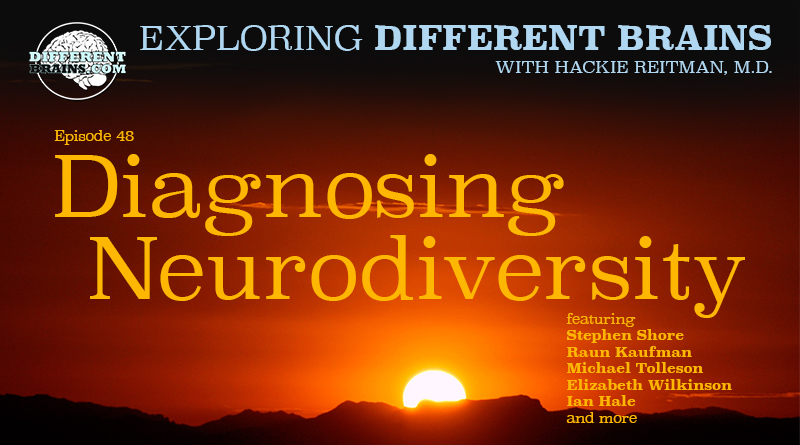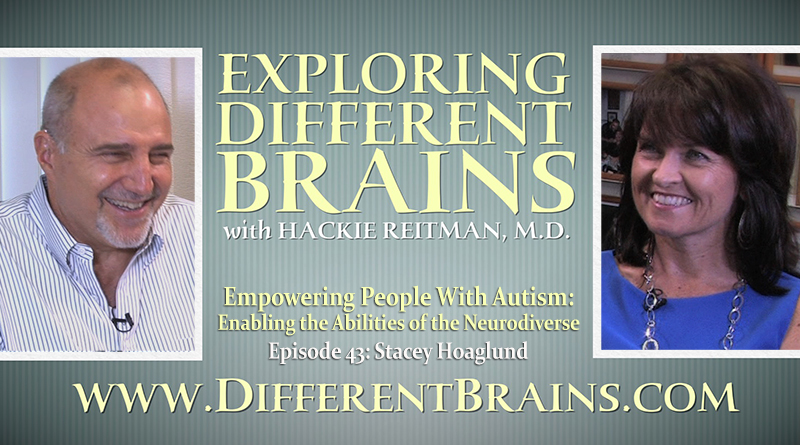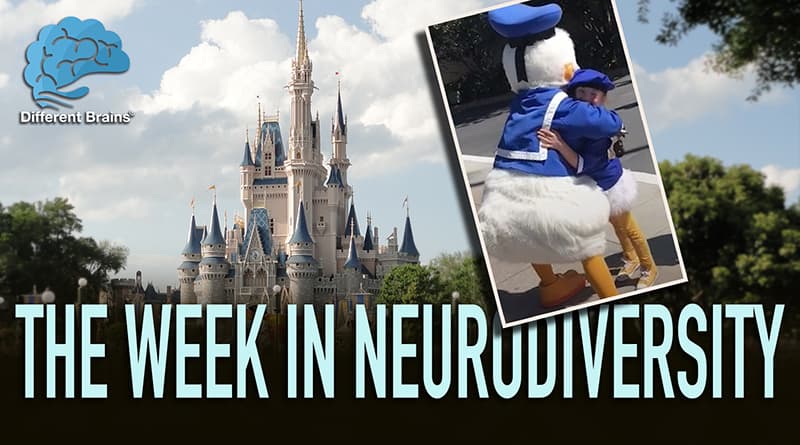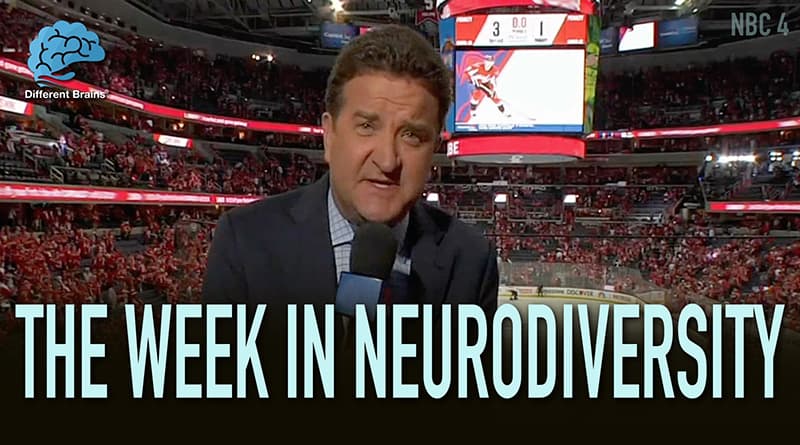
Diagnosing Neurodiversity: 7 Advocates Tell How They Learned They Have Autism | EDB 48
In this special episode of Exploring Different Brains, Hackie Reitman, M.D. presents 7 previous guests as they tell the story of how they were first diagnosed with autism.
Guests include:
Raun Kaufman is the head of the Autism Treatment Center, and author of the book “Autism Breakthrough.” For his full interview, visit: http://differentbrains.com/exploring-different-brains-episode-1-raun-kaufman/
Ron Sandison is a preacher, has an amazing savant memory, and is the author of “A Parent’s Guide to Autism: Practical Advice. Biblical Wisdom.” For more information on Ron, visit his site: www.spectruminclusion.com. For his full interview, visit: http://differentbrains.com/autism-and-the-power-of-memory-with-ron-sandison-exploring-different-brains-episode-11/
Eric Zimmerman, founder of The Buddy Project and author of “Anything But Ordinary.” To learn more about Eric’s work, please visit his website: www.TheBuddyProject.net. For his full interview, visit: http://differentbrains.com/eric-zimmerman-exploring-different-brains-episode-15/
Ian Hale, Ph.D. is a writer, poet, public speaker and researcher. For more information, visit: ianchalephd.com. Look for Dr. Hale’s books at Amazon.com-The Insider’s Guide to Autism and Asperger’s, Dance With The Desert, and Emotional Exile. For his full interview, visit: Part 1- http://differentbrains.com/autism-family-tree-ian-hale-ph-d-edb-episode-36/ and Part 2- http://differentbrains.com/poetry-aspergers-self-expression-spectrum-ian-hale-ph-d-edb-episode-37/
Michael Tolleson is an autistic savant artist. Visit Michael’s sites to see is work and learn about seeing him speak.:
www.bookmichaeltolleson.com and www.michaeltollesonartist.com. For his full interview, visit: http://differentbrains.com/exploring-different-brains-episode-04-michael-tolleson/
Stephen Shore is an author and autism advocate. For more information about the work of Stephen Shore, please visit his website www.AutismAsperger.net and visit his facebook page www.facebook.com/tumbalaika. For his full interview, visit: http://differentbrains.com/exploring-different-brains-episode-07-stephen-shore/
Elizabeth Wilkinson is a British autism and dyslexia advocate known as The Dyslexic Dyslexia Consultant , and founder of Dyslexia Information Day. For more information about Elizabeth’s work, visit www.theddc.org.uk. For her full interview, visit: http://differentbrains.com/exploring-different-brains-episode-10-elizabeth-wilkinson/
80 Second Preview:
To listen or download the podcast version of this episode, see the embedded player below.
Or look for us on your favorite podcast provider:
iTunes | Stitcher | SoundCloud
[expand title=”View Full Transcript”]
RAUN KAUFMAN
So, when I was a little boy, I was diagnosed with severe Autism. When I say severe, just so we’re clear, I’m talking about I had no language, no eye contact, a tested IQ less than 30. I would spend hours and hours every day rocking back and forth and flapping hands in f t of my face. One of the things I would also do for many hours a day is that I would take kitchen plates and I would spin them on their edge on the floor over and over and I would flap my hands over them. For hours and you couldn’t distract me from this. And my parents were told like I said I had severe Autism, I just said it was–not just that it was severe in the moment, and this is important, because it’s not just the diagnosis that’s the issue. It’s the prognosis, and the prognosis that my parents got was that this is a permanent life-long condition.
This was how I was going to be for the rest of my days on earth. And they did something really amazing in the face of that, which was they developed their own home based, very much child centered program. And they call it the “Sonrise Program”–but they spelled it “S-O-N” because I was their son. And they worked with me for about 3 and a half years and at the end of that period as you can guess, I went on to recover completely without any trace of my former condition, grew up in a regular school with regular friends and graduated from Ivy league’s Brown University with a degree in Biomedical ethics, which was never supposed to be in the cards for me. And now, it’s really amazing because now with our whole team of about 80 other people at the Autism Treatment Center of America in Massachusetts, I am able to sort of work with these people and then work with parents and families from over 100 different countries to help them help their children in the same way that my parents helped me.
So, it’s really an honor and its also been kind of a crazy experience because after my recovery, my Father wrote this book called; “Sonrise: The Miracle Continues”. It became a best seller. It was then made into an NBC television movie. So then, people started coming to us for help and in 1983 my parents founded a non-profit organization now known as the Autism Treatment Center of America. So, it’s a non-profit organization, really nicely nestled in kind of the Bertram Mountains in the Berkshires in Massachusetts. And that’s where I was telling you about people and parents and educators come from all over to learn the techniques of the Sonrise program
RON SANDISON
My name’s Ron Sandison and I have autism, and my development began normal, and at 18 months I hit the “Autism Time Clock.” It goes “tick-tick” and then I lost my ability to have eye contact, I also lost my ability to say words that I had previously learned. I said my first word at 9 months, which was “mommy,” and then at 18 months, I lost the ability to say mommy and all I could say is “mum–mum–” and my mom knew something was wrong at the 18 month mark. And I had testing done, at age 7 I was diagnosed as having autism. And, at age eight, the school specialist told my parents that I’d never read beyond a seventh-grade level, I’d never excel in sports and I’d never get married or have any meaningful relationships.
My mom was determined to prove the experts wrong. And she took–the school wanted to diagnose me, before I was diagnosed as autism, as emotionally impaired, and my mom said, “it’s not emotional, it’s neurological.” And then, when the testing was done at Henry Ford hospital in 1983, when I was eight years old, it came back and it was autism.
ERIC ZIMMERMAN
Yes, I was diagnosed rather late–I was diagnosed in high school with having Asperger’s. I was diagnosed–I had a very turbulent childhood. I’m actually on a speaking tour talking about my childhood and how–because autism wasn’t really known as much so back when I was a child. I’m 28 years old, so when I was late–when I was a little child it wasn’t really known, and so they diagnosed me with having ADD.
And having all of these other things, which, yeah, I might have–obsessive compulsive disorder, I have a really bad anxiety disorder, but–all of the other things, it just kind of didn’t–they didn’t know that I was on the spectrum, so it took actually until I’ve seen a certain doctor and his wife worked with a lot of the kids on the spectrum, and he is like I really want you to talk to my wife. He was kind of the old-fashioned psychiatrist where he would also do therapy–and so him and I would just sit around and talk for an hour and then he would give me my prescriptions, but after all of the things I would tell him, and all of my obsessive interests in the things and my knowledge in the things, and a lot of the social issues I have, you really need to talk to my wife.
So I left my therapist for like seven years at the time and went and spoke to his wife, and she was very helpful, she was able to help me with a lot of things and say, ‘Yeah, you know, you’re definitely on the spectrum,’ and later on I was also–had officially diagnosed by the state of Maryland as having that–I had to go through special testing with–you know, from a psychologist and they charge an arm and a leg for it, but in order to get so many services I did get, I had to go and do that.
HR
Somewhere along the line, you can tell us where, you figured out that you’re autistic. Is that correct?
IAN HALE
Well, I was a problem at primary school. I think we were good in elementary school. I wasn’t really doing anything in school, and Britain didn’t know anything about this in the 1960s-1970s. I mean the term Asperger’s syndrome was first used in Britain only in 1996. It wasn’t until I was working at university when one of my students came with a file from the students’ home country, saying the particular student has Asperger’s syndrome. But I started to research Asperger’s and realized that, my goodness I take 52 out of every 50 of these boxes and then I went to see a world renowned specialist at Carleck University, called professor William Braizer, and he diagnosed me fully. A diagnosis which had been confirmed by the university of Cambridge, and also by analyzing my genome, because all autism is inherited normally by design. At that stage, I researched my family history back about 250 years and realized that some of these were pretty weird people as well. Reading their letters and their correspondents and what people have said about them.
MICHAEL TOLLESON (MT)
So what we do is: I have a husband who is also autistic. We’re both Asperger’s. What we started to do very early was we started to work with the autistic community–this is even before we knew we were autistic. So we did it as a give-back, we were both creating art, we were both doing very well, we were getting in galleries, and what we decided is we were going to reach out to a community that needed us. And the autistic community needed us. So we started working with the kids–what we found was we had a communication with them like none other, and sometimes we understood them even more than their parents because we were them.
When we first started looking at these children we’re going like, “Oh my gosh, we are these children.” And then we started meeting some of the Asperger parents and I was like, “Ut-oh, I’m a carbon-copy.” As we went through that process, we started online. We started to look at different online tests. Through the tests, one of them was pretty comprehensive. It had like 200 questions, it evaluated different aspects, and I scored very high. Jack scored very high. We both did. But we self-diagnosed first.
Then, recently, I started to get to the point where I needed, in my own mind, to have an official diagnosis. I just felt, for one thing, I was throwing myself out into the autistic community and I wanted to be able to say, with verification, “Yes, I’m autistic.” So we have a–we have gone through some stress because of the town stuff and we got involved with some psychiatrists and some health providers, and during that process, I asked them to go ahead and evaluate me, so at that point they gave me the official diagnosis.
HR
Do you think your life would have been altered or easier or harder or whatever, had you been diagnosed earlier?
MT
I think I could have probably avoided some of the pitballs that I have, and I think I have a good chunk of about 20 years of my life that I self-medicated through alcohol and drugs, because I didn’t understand I couldn’t fit in. I didn’t understand I couldn’t make an entrance. I think that that period of my life, even though I pretended to be happy and social and lots of things, in actuality I was miserable, and I tried to buy my friends, and I think had I got a diagnosis early, I could have understood more who I was.
STEPHEN SHORE (SS)
Well, after 18 months of typical development, I got hit with, what I call, the autism bomb. Otherwise known as regressive autism. So I lost functional communication, had meltdowns, withdrew from the environment, and, in short, became a pretty significantly effected child on the autism spectrum. There was so little known about autism then that it took my parents a whole year to find a place for diagnosis. And, when they did, now I’m 2 and a half and it’s 1964, the doctors said that they had never seen a child who was so sick. And they recommended institutionalization. Fortunately, my parents, like we see so many parents today, they advocated on my behalf and they convinced the school to take me in about a year. And it was during that year that my parents implemented what we would, today, refer to as, an “Intensive Home-Based Early Intervention Program,” emphasizing music, movement, self-reintegration, narration and imitation. And that’s just today’s terminology. In those days, the concept of early intervention didn’t even exist. And with the work that they did, speech began to return at age 4, when I was then admitted to the school that initially rejected me. I got reevalutated, instead of being considered as having strong autistic tendencies, and atypical development, and being a psychotic child, I got upgraded to neurotic, so things are moving up in the world.
HR
Well, I’m glad you’re neurotic, Steve. Join the club.
SS
Yeah, well, it’s more fun.
ELIZABETH WILKINSON
I’m dyslexic autistic, and I found out I was autistic six years ago, found out I was dyslexic–well I’m 43 now, found out I was dyslexic when I was 28, I think it was, we’ll say. I can’t remember, anyway, longer than I’ve known about the autism. Both labels have meant quite a lot to me understanding myself and how I work, particularly the autism diagnosis. I’ve been a lot nicer to myself since finding out. However, the Dyslexic Dyslexia Consultant started in 2007 January, so we just turned nine. And my passion is to educate everybody around me about dyslexia, raise awareness and make people aware.
I did a course to find out about dyslexia because I thought my son was, and, from there, everything made sense. I knew the answers to questions, I understood the topics, I was getting good grades on my assignments because I understood the subject. So I, personally, had done a lot of research, had done a lot of reading around dyslexia, and I came across a book by Dr. Tilly Mortimore, who is my idol, I have to say, when it comes to dyslexia. And it was her first book about dyslexic learning styles that I learned about the three core deficits of dyslexia, so I learned about short-term memory difficulties, automatisty difficulties and phonological difficulties, and they made sense, and I understood about myself, so, for me, my advice to people is find out how something effects you and have that impact on your everyday life.
[/expand]
This video is owned by Different Brains Inc, kindly donated by it’s original producer PCE Media LLC.
Different Brains® Inc. founder Harold “Hackie” Reitman, M.D. is an author, filmmaker, retired orthopedic surgeon, former professional heavyweight boxer, the past chairman and president (and current board member) of The Boys and Girls Clubs of Broward County, and a neurodiversity advocate. However, it was his role as a father that led to the creation of the DifferentBrains.org website.
Hackie’s daughter Rebecca grew up with epilepsy, 23 vascular brains tumors, and underwent 2 brain surgeries before the age of 5. Her struggles and recovery put him on the road to, through 26 professional heavyweight boxing matches, raising money for children’s charities (to which he donated every fight purse).
Rebecca eventually went on to graduate from Georgia Tech with a degree in Discrete Mathematics, and Dr. Reitman wrote and produced a film based on her experiences there (The Square Root of 2, starring Darby Stanchfield of ABC’s Scandal). After graduation, Rebecca received a diagnosis of Asperger’s syndrome. Hackie, shocked at his own ignorance of the topic despite being an M.D., embarked on years of research that culminated with his book Aspertools: The Practical Guide for Understanding and Embracing Asperger’s, Autism Spectrum Disorders, and Neurodiversity (released by HCI books, publishers of the Chicken Soup for the Soul series).
This experience revealed to Hackie the interconnectedness of the conditions that fall under the neurodiversity umbrella, while alerting him to the in-fighting and fractured relations that often plague the organizations tasked with serving the community. Convinced that overcoming these schisms could help all of society, Hackie forged the Different Brains philosophy of inclusive advocacy: “Supporting Neurodiversity – From Autism to Alzheimer’s and All Brains In Between”.
In the company’s initial years of operation, Hackie self-financed all of the content on DifferentBrains.org, all of which offered free to view to the public. Currently he is the host of our weekly interview show Exploring Different Brains, writes blogs for the site, and tours the country speaking at conferences, conventions and private functions, all with the goal of improving the lives of neurodiverse individuals and their families, and maximizing the potential of those with different brains. Separate from Different Brains, Hackie is the founder and CEO of PCE Media, a media production company focusing on reality based content. He recently co-executive produced the documentary “Foreman”, the definitive feature documentary on legendary boxer and pitchman George Foreman.




